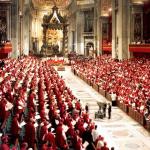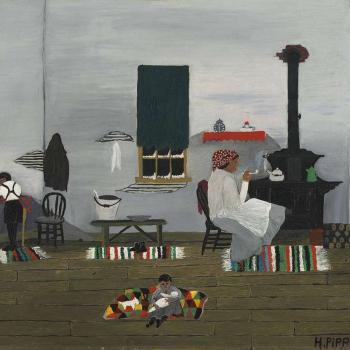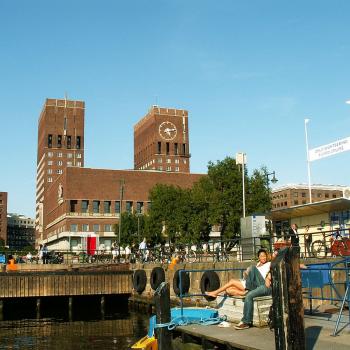A bishop is meant to teach his flock. This duty implies the teaching of right conduct to his people. This right conduct is not just manners; it is not just being “decent.” It requires right belief; it requires serving the poor and not doing anything that harms or destroys another. In a word, it requires politics in a broad sense.
Many more such passages can be found in the wisdom books of Scripture, though not merely there. Later bishops were intensely politically involved: Augustine, Ambrose, and John Chrysostom come to mind immediately. Each could be quoted at length to the effect that part of their duty is the instruction of their flocks. This means instructing them in how to act rightly, yes. Further, however, it implies that the individual right conduct of the believers develops into a just and justly-organized society. We should not fool ourselves into thinking God only judges individuals. What of Sodom and Gomorrah? What of Jericho? Likewise, the moral duties of the bishop do not end with the individual soul (hence why the bishop, like the Good Shepherd, tends a flock—a collective). A famous quotation from St. Ambrose shows just how far this sort of exhortation to a group (here, the rich) could go:
How far, O rich, do you extend your senseless avarice? Do you intend to be the sole inhabitants of the earth? Why do you drive out the fellow sharers of nature, and claim it all for yourselves? The earth was made for all, rich and poor, in common. Why do you rich claim it as your exclusive right? The soil was given to the rich and poor in common—wherefore, oh, ye rich, do you unjustly claim it for yourselves alone? Nature gave all things in common for the use of all; usurpation created private rights. Property hath no rights. The earth is the Lord’s, and we are his offspring. The pagans hold earth as property. They do blaspheme God. (The Cry for Justice 397)
Medieval bishops extended their hands into politics, for better and for worse. Odo of Bayeux fought at the Battle of Hastings (famously, he is supposed to have used a club, so as to get around the prohibition on clergy spilling blood). St. Thomas Becket resisted Henry II. Bishop Despenser led a crusade against the French in the Low Countries in the 14th century (never mind the extent of his involvement back home in England). Archbishop Arundel played a leading role in Henry IV’s deposing of Richard II. The list goes on and on into the modern era, when Bishop von Galen spoke out against Nazism; other bishops, like those recently beatified in the Romanian Greek Catholic Church, were killed for protesting Soviet rule.
The point, I hope, is clear enough: bishops have never not been political. Their influence—for good and for ill—has never been restricted to the care of individual souls; further, their interest in moral formation, specifically the moral formation of communities, has meant an aim at justice. For St. Ambrose, as seen above, to preach uprightness is to preach against social ills. The two can hardly be separated.
We might address the second argument—pertaining to private property—by beginning with the quotation just mentioned: “Nature gave all things in common for the use of all; usurpation created private rights. Property hath no rights. The earth is the Lord’s, and we are his offspring. The pagans hold earth as property. They do blaspheme God.” We might go even further here by quoting Aquinas as length (there is, of course, beauty in the subtlety of Scholastic prose):
Things which are of human right cannot derogate from natural right or Divine right. Now according to the natural order established by Divine Providence, inferior things are ordained for the purpose of succoring man’s needs by their means. Wherefore the division and appropriation of things which are based on human law, do not preclude the fact that man’s needs have to be remedied by means of these very things. Hence whatever certain people have in superabundance is due, by natural law, to the purpose of succoring the poor. For this reason Ambrose[Loc. cit., Article 2, Objection 3] says, and his words are embodied in the Decretals (Dist. xlvii, can. Sicut ii): “It is the hungry man’s bread that you withhold, the naked man’s cloak that you store away, the money that you bury in the earth is the price of the poor man’s ransom and freedom.”
Since, however, there are many who are in need, while it is impossible for all to be succored by means of the same thing, each one is entrusted with the stewardship of his own things, so that out of them he may come to the aid of those who are in need. Nevertheless, if the need be so manifest and urgent, that it is evident that the present need must be remedied by whatever means be at hand (for instance when a person is in some imminent danger, and there is no other possible remedy), then it is lawful for a man to succor his own need by means of another’s property, by taking it either openly or secretly: nor is this properly speaking theft or robbery. (ST II-II, Q66, A7)













